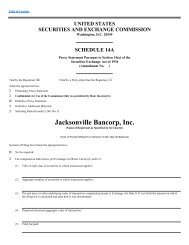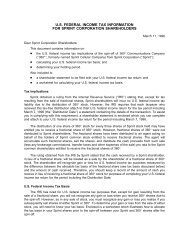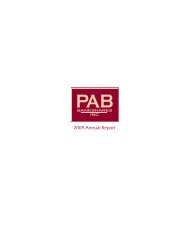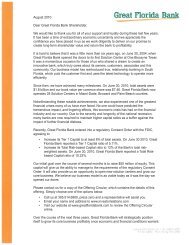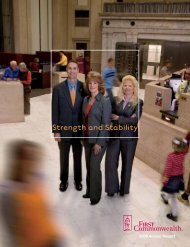Cousins Properties Incorporated 2006 Annual Report - SNL Financial
Cousins Properties Incorporated 2006 Annual Report - SNL Financial
Cousins Properties Incorporated 2006 Annual Report - SNL Financial
Create successful ePaper yourself
Turn your PDF publications into a flip-book with our unique Google optimized e-Paper software.
Financing Risks<br />
If interest rates or other market conditions for obtaining capital become unfavorable, we may be unable<br />
to raise capital needed to build our developments on a timely basis, or we may be forced to borrow money<br />
at higher interest rates or under adverse terms, which could adversely affect returns on our development<br />
projects, our cash flow and results of operations.<br />
We finance our development projects through one or more of the following: our credit facility, permanent<br />
mortgages, proceeds from the sale of assets, secured and unsecured construction facilities, and joint venture equity.<br />
In addition, we have raised capital through the issuance of perpetual preferred stock to supplement our capital<br />
needs. Each of these sources may be constrained from time to time because of market conditions, and interest rates<br />
may be unfavorable at any given point in time. These sources of capital, and the risks associated with each, include<br />
the following:<br />
Credit facilities. Terms and conditions available in the marketplace for credit facilities vary over time. We<br />
can provide no assurance that the amount we need from our credit facility will be available at any given time,<br />
or at all, or that the rates and fees charged by the lenders will be acceptable to us. We incur interest under our<br />
credit facility at a variable rate. Variable rate debt creates higher debt service requirements if market interest<br />
rates increase, which would adversely affect our cash flow and results of operations. Our credit facility<br />
contains customary restrictions, requirements and other limitations on our ability to incur indebtedness,<br />
including restrictions on total debt outstanding, restrictions on secured debt outstanding, requirements to<br />
maintain minimum debt service coverage ratios and minimum ratios of unencumbered assets to unsecured<br />
debt. Our continued ability to borrow under our credit facility is subject to compliance with our financial and<br />
other covenants. In addition, our failure to comply with such covenants could cause a default, and we may<br />
then be required to repay such debt with capital from other sources. Under those circumstances, other<br />
sources of capital may not be available to us, or may be available only on unattractive terms.<br />
Mortgage financing. The availability of financing in the mortgage markets varies from time to time<br />
depending on various conditions, including the willingness of mortgage lenders to lend at any given point in<br />
time. Interest rates may also be volatile and we may from time to time elect not to proceed with mortgage<br />
financing due to unfavorable interest rates. This could adversely affect our ability to finance development<br />
activities. In addition, if a property is mortgaged to secure payment of indebtedness and we are unable to<br />
make the mortgage payments, the lender may foreclose, resulting in loss of income and asset value.<br />
Property sales. Real estate markets tend to experience market cycles. Because of such cycles the potential<br />
terms and conditions of sales, including prices, may be unfavorable for extended periods of time. In addition,<br />
federal tax laws limit our ability to sell properties and this may affect our ability to sell properties without<br />
adversely affecting returns to our stockholders. These restrictions reduce our ability to respond to changes in<br />
the performance of our investments and could adversely affect our financial condition and results of<br />
operations. This could impair our ability to raise capital through property sales in order to fund our<br />
development projects or other cash needs. In addition, mortgage financing on a property may impose a<br />
prepayment penalty in the event the financing is prepaid, which may decrease the proceeds from a sale or<br />
refinancing or make the sale or refinancing impractical.<br />
Construction facilities. Construction facilities generally relate to specific assets under construction and<br />
fund costs above an initial equity amount deemed acceptable to the lender. Terms and conditions of<br />
construction facilities vary but they generally carry a term of two to five years, charge interest at variable<br />
rates and require the lender to be satisfied with the nature and amount of construction costs prior to funding.<br />
While construction lending is competitive and offered by many financial institutions, there may be times<br />
when these facilities are not available or are only available upon unfavorable terms which could have an<br />
adverse effect on our ability to fund development projects or on our ability to achieve the returns we expect.<br />
Joint ventures. Joint ventures, including partnerships or limited liability companies, tend to be complex<br />
arrangements, and there are only a limited number of parties willing to undertake such investment structures.<br />
There is no guarantee that we will be able to undertake these ventures at the times we need capital.<br />
10





